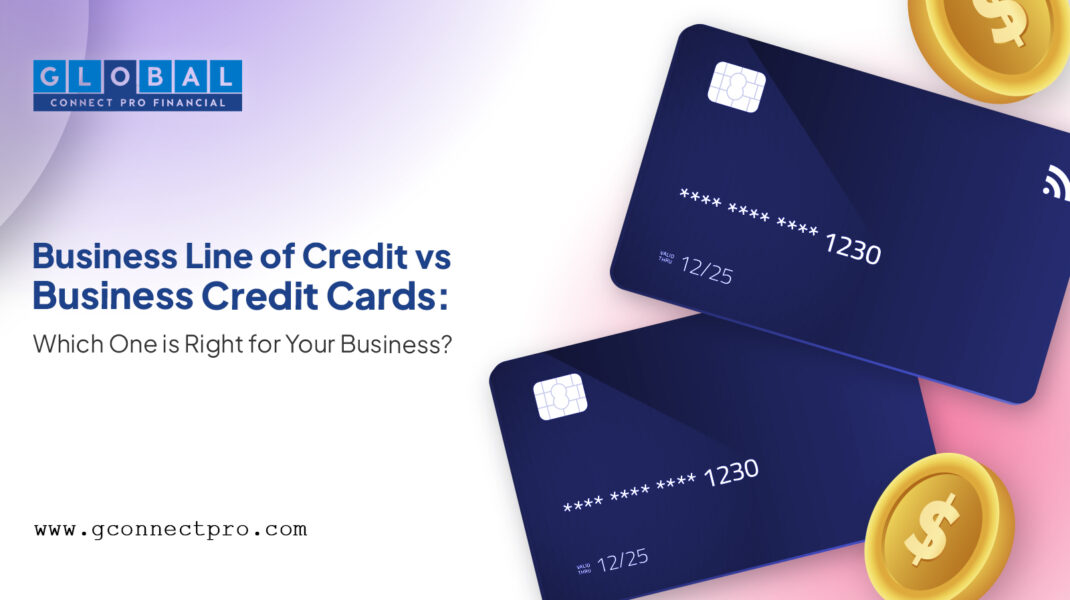Business Line of Credit vs. Business Credit Cards: Which to Choose?

When your business needs access to extra funds, there are several financing options available. Two common choices are a business line of credit and a business credit card. Both options offer flexibility, but they differ in how they work and what they’re best used for. In this blog, we’ll break down the key differences between these two financing tools to help you decide which one is best for your business needs.
What is a Business Line of Credit?
A business line of credit is a revolving credit account that allows you to borrow up to a certain limit whenever you need funds. You can use this money for any business-related expenses, such as paying for equipment, covering payroll, or managing cash flow gaps. Similar to a personal line of credit, a business line of credit lets you borrow, repay, and borrow again as long as you stay within your credit limit.
What is a Business Credit Card?
A business credit card is a credit card specifically for business use. It allows you to make purchases and borrow money up to a certain credit limit. Business credit cards often come with rewards like cash back or travel points, which can be useful for business-related expenses. They are best for day-to-day spending, such as purchasing office supplies, paying for business travel, or covering small operational costs.
Key Differences Between Business Line of Credit and Business Credit Cards
1. Credit Limit and Borrowing Flexibility
- Business Line of Credit: You’ll typically be approved for a larger credit limit with a line of credit. The limit can range from a few thousand to several hundred thousand dollars, depending on your business’s financial health. You can draw from this line whenever you need it, and you only pay interest on the amount you’ve borrowed.
- Business Credit Card: Credit limits on business credit cards are often lower than a line of credit and can vary based on your creditworthiness. While they are flexible for everyday spending, they may not offer as much available credit for larger business expenses or long-term projects.
2. Interest Rates
- Business Line of Credit: A business line of credit typically offers more flexible repayment terms. You can make minimum payments or pay off your balance in full to avoid high interest charges. If you pay off your balance, you can continue borrowing up to your credit limit.
- Business Credit Card: Business credit cards often require monthly payments that include both the principal and interest. If you carry a balance, you’ll be charged interest on the amount owed. Missing payments can lead to late fees and penalties, and your interest rate may increase.
4. Usage and Convenience
- Business Line of Credit: A business line of credit is often better for larger, irregular, or emergency expenses, such as unexpected repairs or seasonal business needs. You can access funds through a check, a wire transfer, or a debit card tied to the line of credit.
- Business Credit Card: Business credit cards are ideal for everyday purchases, especially if your business has consistent small expenses. They are often more convenient for transactions like buying office supplies, booking travel, or paying for meals. Plus, many business cards offer rewards or cashback for these types of purchases.
5. Rewards and Perks
- Business Line of Credit: Business lines of credit generally don’t offer rewards or perks. They are focused purely on giving you access to funds when you need them, with the flexibility to use the money for almost anything related to your business.
- Business Credit Card: Many business credit cards offer rewards such as cash back, travel points, or discounts on certain purchases. These rewards can be beneficial if you use the card for regular business expenses. However, the rewards may not outweigh the higher interest rates if you carry a balance.
6. Credit Impact
- Business Line of Credit: Using a business line of credit responsibly—by keeping your balance low and making payments on time—can help improve your business’s credit score. However, if you max out your line or miss payments, it can negatively impact your credit.
- Business Credit Card: Business credit cards also impact your business credit score. Making timely payments and keeping your utilization rate low (the amount of your credit limit that you’re using) can help improve your credit. However, high balances or missed payments can hurt your credit score.
Which Option is Right for Your Business?
Choosing between a business line of credit and a business credit card depends on your needs:
- Opt for a Business Line of Credit if: You need access to larger sums of money for unpredictable expenses, prefer flexible repayment terms, and want to keep borrowing against the line as needed.
- Opt for a Business Credit Card if: You’re looking for a convenient way to pay for day-to-day expenses, want rewards for your purchases, and don’t need a large credit limit.
Conclusion
Both business lines of credit and business credit cards offer flexibility, but they serve different purposes. A business line of credit is ideal for larger, more variable expenses, while a business credit card is better suited for regular, smaller purchases. By understanding the key differences, you can choose the best option for your business’s financial needs and make smart decisions to help your business grow.


Write a reply or comment
You must be logged in to post a comment.